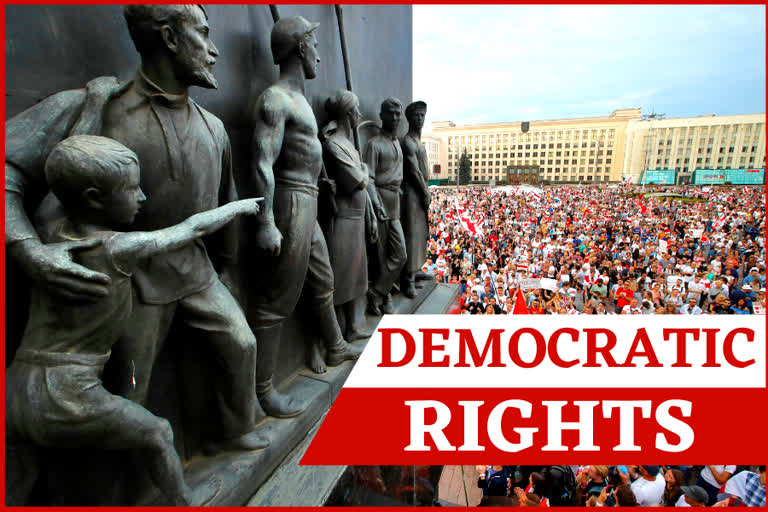Brussels: European Union leaders on Wednesday said they stand beside the people protesting for democratic rights in Belarus, underlining that the EU rejects the election results that kept the country's leader of 26 years in power and is preparing a list of Belarusians who face sanctions over vote fraud and a brutal crackdown on protesters.
"The European Union stands in solidarity with the people of Belarus, and we don't accept impunity," European Council President Charles Michel told reporters after chairing an emergency teleconference. "We don't recognize the results presented by the Belarus authorities".
Read also: Police, protesters clash after Belarus presidential vote
Michel said the EU will impose sanctions on "a substantial number" of people linked to election fraud and violence. He declined to name any of those who might be listed. He also said that the 27-nation bloc fully supports mediating efforts between the Belarusian government and opposition overseen by the Organization for Security and Cooperation in Europe.
Belarus security forces detained almost 7,000 people and injured hundreds with rubber bullets, stun grenades and clubs in the first four days of demonstrations. At least two protesters died.
Workers at state-controlled companies have joined strikes this week, as the unprecedented mass protests enter their 11th day and erode the authority of the man once dubbed "Europe's last dictator." The results of the Aug. 9 polls handed Lukashenko his sixth term with 80% of the vote, while the opposition candidate with the most support received 10%.
Watch: Belarus challenger urges EU to support 'awakening' country
"The elections were neither fair nor free and therefore one cannot recognize the result of the elections," German Chancellor Angela Merkel said in Berlin. She condemned the "brutal violence" against peaceful protesters and called on the regime to release all prisoners without conditions.
In a joint statement, the presidents of the Czech Republic, Hungary, Poland and Slovakia — countries known as the Visegrad Four — called on Belarus authorities to "open the way for a political solution, and to abide by the fundamental human rights and freedoms while refraining from the use of violence against the peaceful demonstrators".
They urged unnamed "foreign actors to refrain from actions that would undermine Belarus' independence and sovereignty".
In a video statement ahead of the virtual EU summit, Belarusian opposition leader Sviatlana Tsikhanouskaya called on Europe to support "the awakening of Belarus".
"I call on you not to recognize these fraudulent elections. Mr. Lukashenko has lost all the legitimacy in the eyes of our nation and the world," Tsikhanouskaya said.
On the eve of the meeting, Michel had a half-hour telephone conversation with President Vladimir Putin to share the EU's concern about election irregularities and the scale of the security crackdown, and to impress upon the Russian leader the right of the Belarus people to determine their own future.
They discussed ways to encourage talks between Lukashenko and the opposition.
The relatively small EU nation of Lithuania is playing a major role as the protests unfold by giving refuge to Tsikhanouskaya. Its Baltic neighbours, Estonia and Latvia, are also deeply involved in diplomatic efforts, as is Poland.
Some in Europe are concerned that hitting Lukashenko and his associates too hard might drive Belarus into the arms of Russia, even though relations between Minsk and Moscow have been troubled in recent years and even more tense in the run up to the polls. Others fear Russian intervention.
But experts tend to play down those worries, and say the people of Belarus only want to secure independence, and are not interested in deeper relations with Russia, the European Union, or in joining Moscow's nemesis, the NATO military alliance.
Belarus is not Georgia or Ukraine, where Putin fanned the flames of conflict by backing pro-Russian separatists.
Ekaterina Pierson-Lyzhina, a Brussels-based researcher into Belarus' EU foreign policy, said that recent surveys suggest around 60% of people want the country to remain independent and reject any kind of union. Smaller groups are divided up into those who support European or Russian integration.
"There are no European flags, no Russian flags. This revolution is about domestic dissatisfaction of the majority of Belarusians with their president, who has held a grip on power for 26 years," she said, and urged the EU to set up a fund for victims of the crackdown and help build a database on police crimes.
AP



